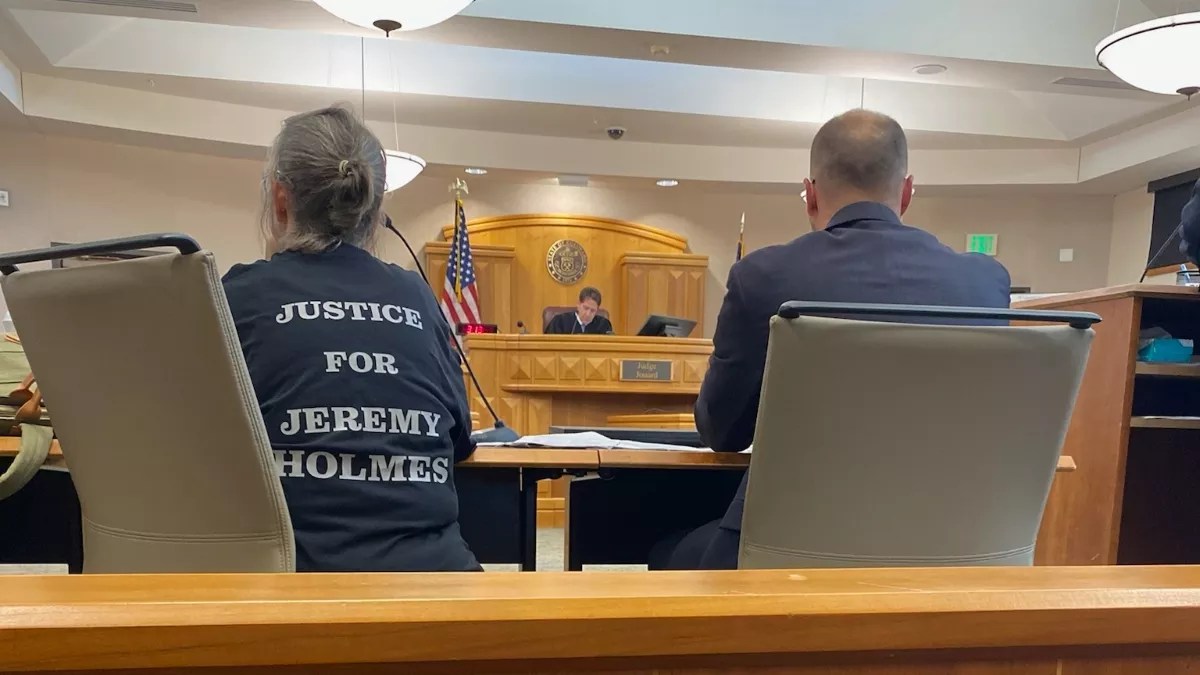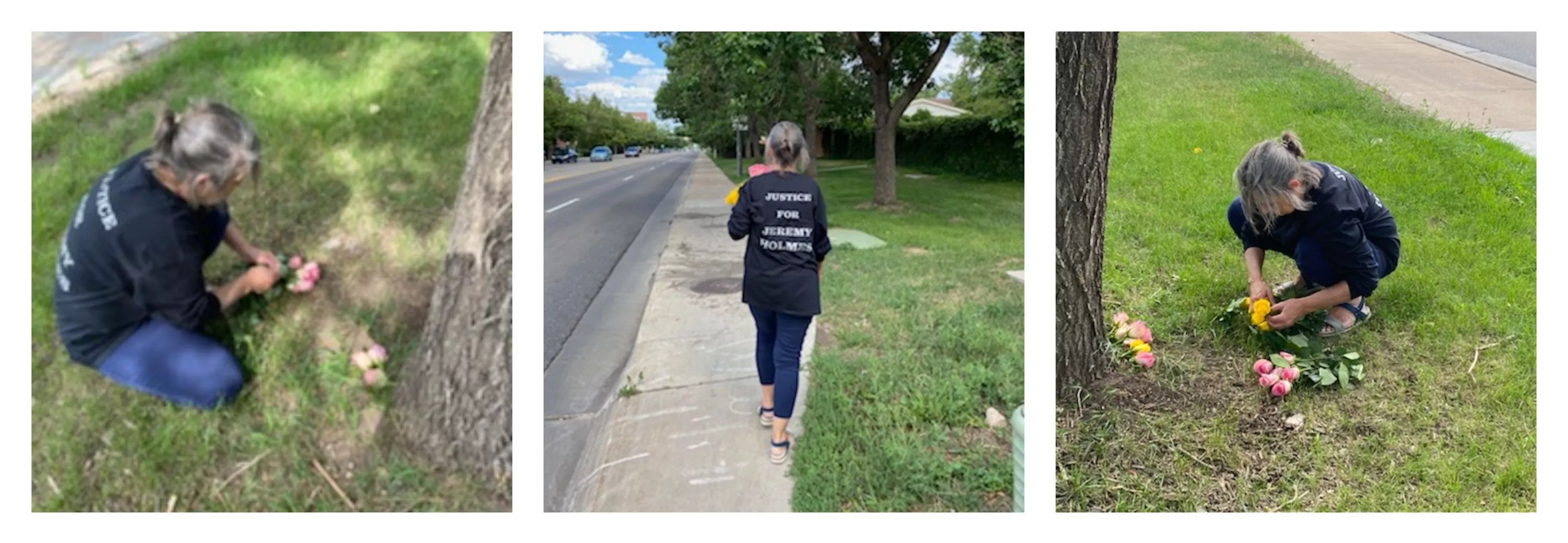
Photo courtesy of Susan Holmes

Audio By Carbonatix
By any measure, the prosecution of Susan Holmes for checking a box on an extreme risk protection order form saying that she and Colorado State University Police Corporal Phil Morris had a child in common – her son, Jeremy Holmes, shot to death by Morris five years ago this month – has been extraordinary.
Authorities relentlessly hounded the former Fort Collins resident, who’s in her late sixties, even declaring her the most wanted person in Larimer County in January 2020 before breaking into her home and arresting her during a livestream of an interview about her situation the next month. Holmes was eventually charged with multiple felonies, and on July 19, she was sentenced to two years of supervised probation after being found guilty on two of them: perjury and an attempt to influence a public servant.
According to research conducted by attorney Jonathan Greenlee, who represented Holmes, she was the first person in Larimer County to be put on trial for entering false information on a protection order in around two decades – and even after her two-and-a-half-year journey through the legal system, she still doesn’t believe she did anything wrong.
“I consider them to be completely false charges,” she says from Florida, where she now lives, in her first interview since being sentenced. “And I consider the prosecution selective and vindictive. I was targeted.”
Even before the recent sentencing, Holmes’s punishment had been severe. When she traveled to New Mexico late last year in violation of her personal recognizance bond, which compelled her to stay in Colorado until her trial, a nationwide warrant was issued in her name, and she was subsequently arrested and jailed for nearly six months because she couldn’t afford to pay the $10,000 bond. During that time, she conducted a month-plus-long hunger strike that resulted in her being rushed to a hospital, and she says she now suffers from debilitating illnesses that have absolutely destroyed her health. But while she’s capable of drawing breath, she refuses to be muzzled.
“I’m not going to stop,” she stresses. “I’m never going to stop advocating and fighting for my son.”

A portrait of the late Jeremy Holmes.
Courtesy of Susan Holmes
In the weeks prior to his death, Jeremy, whom Holmes has characterized as “an insightful, brilliant person” with a knack for computer-game design, had such a bad reaction to marijuana that she believes he was suffering from an exceedingly rare condition known as cannabis-induced psychosis. Suddenly, he was having uncommon mood swings and making violent threats against his older brother, Alex, who lived with his wife in an apartment on the CSU campus. He’d never previously owned a weapon, but Jeremy obtained a knife three days before his death, ostensibly to protect the family following an attempted break-in of the Fort Collins-area home he shared with Holmes.
These issues came to a head on July 1, 2017, when Jeremy became upset that Alex had told him not to visit; Holmes said her older son had received several “strange” phone calls from Jeremy when he was in the midst of a major project. Shortly thereafter, an obviously depressed Jeremy, whom Holmes thinks had smoked more marijuana, picked up the knife, which was covered by a sheath, and perambulated to Alex’s apartment, located about two miles from the house – after first saying that he was angry and wanted to kill him.
Holmes called Alex but didn’t get an answer. So she phoned the CSU campus police and asked for an officer to be dispatched to Alex’s place to warn him and her daughter-in-law not to answer the door if Jeremy arrived. Holmes specifically recalls telling the operator that Jeremy was mentally ill.
CSU police officer Katie Aron was sent to Alex’s apartment, and spoke with him and his wife. Also captured in Aron’s video: the moment during her conversation with the couple when she heard a scream and ran off to what turned out to be the scene of the shooting.
Jeremy was indeed nearby, but he never went to Alex’s apartment. Instead, he was walking along Prospect Road, on the far side of a six-foot-tall fence. At that point, Jeremy had the knife in his hand; the sheath had been removed, but he hadn’t made any more threats or taken other threatening actions.
Morris, who was also on the scene, drove up to Jeremy and confronted him with a gun. Jeremy responded with suicidal statements, asking Morris to kill him. Morris yelled at him to drop the knife, but Jeremy continued holding the weapon as he walked toward the officer, who backed up in response. Seconds later, Fort Collins Police Services officer Erin Mast arrived at the scene, executing a U-turn in her vehicle and emerging from behind the wheel with her gun drawn to issue her own order that Jeremy release his grip on the knife. This time, he reacted by moving more strongly toward Morris, prompting both officers to open fire.
Here’s a portion of Corporal Morris’s body-camera video. (The contents may disturb some readers.)
In November 2017, Holmes was shown unredacted body-camera footage of the shooting, but the public never got a chance to see it. In the end, edited versions of the Morris and Mast body-cam videos were shared, but not the Aron material – and Holmes’s very public battle for its release, as well as her call for Morris to be disciplined or criminally charged (his actions were deemed justified), made her persona non grata among many powerful members of the political and law enforcement establishment in Larimer County.
The issue truly blazed to life when Holmes tried to disarm Morris using an extreme risk protection order, or ERPO – a controversial legal procedure that temporarily restricts access to firearms from those deemed a threat to themselves or others. Before marking the portion of the order affirming that she had a child in common with Morris, she says she consulted an attorney who told her that the order’s vague language made such a move acceptable – but the Larimer County Sheriff’s Office and the Larimer County District Attorney’s Office felt differently.
“I exposed the coverup in the murder of my son Jeremy – I exposed their corruption so significantly that they had to silence me and discredit me,” Holmes says. “That’s what this was all about.”
Details of her arguments are shared on Jeremy Holmes Justice, a website she created.
After her February 2020 arrest, Holmes was released from custody but required to stay in the state. She declines to say why she traveled to New Mexico, but notes that on November 5, 2021, she was pulled over for a traffic violation, then busted again after officers there discovered the warrant in her name. She was jailed in New Mexico for several weeks before being transported to a jail in Larimer County that she describes as a “hellhole” that serves “slop” rather than food to inmates.
“I refused to eat and went on a hunger strike,” she remembers. “I didn’t eat for 35 days and almost died. They had to rush me to the hospital because I blacked out and smashed my head on the floor. They put me in chains – it was more torture to go to the hospital than to die on the jail floor – and the emergency room didn’t do anything to help me. They brought me back to the jail, and I was just non-functional. Finally, after a day or two, the jail system finally broke down and gave me a saline solution, but I was pretty much dying.”
The situation grew so dire that Holmes eventually pleaded guilty to a felony charge of breaking her bond on the last day of April, shortly after her conviction for perjury and trying to influence a public servant. “I felt I had no choice,” she emphasizes. “I was under duress.”
After the guilty plea, Holmes was allowed to move to Florida, where members of her family live. “I needed to go to a stable place, since I’d lost everything – everything,” she says. “I had nothing.”

Susan Holmes made a pilgrimage to the spot where her son died on July 19.
Photos courtesy of Susan Holmes
Despite her financial situation, the judge in the perjury case refused to let her take part in the sentencing hearing remotely. Holmes had to travel back to Fort Collins for the July 19 proceedings, which were “very short – maybe half an hour,” she says. She didn’t speak at that session, just as she had remained mum during the trial. Her only statement was the shirt she wore: “Justice for Jeremy Holmes.”
While in Colorado, Holmes visited the spot where Jeremy had died – a location she knew very well. “His blood was there for months,” she says, “and I kept seeing it, because I went there every single day. I took roses every day for months, since it was the only thing I could do to deal with the pain. I also put a statue of Buddha there and planted a bush, and a lot of people who actually heard the shooting came to memorialize Jeremy with little electric candles they put by the tree where he bled out. The coroner’s report said he lost almost all of his blood at that site.”
Holmes’s physical condition remains precarious. “I’ve got serious problems,” she says. “I’ve got heart damage from the time I was in jail and a mass on my lungs.” But as long as she’s able, she is going to speak out about what she sees as her unjust treatment simply because she wanted to reveal the truth about her son’s death.
“This was overkill, and the intention was to silence me,” she contends. “But I won’t be silenced.”